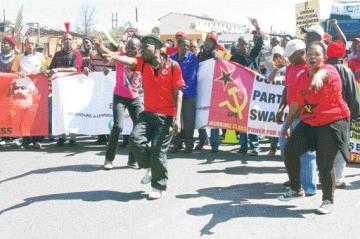
Tuesday, 17 January 2017 (Solidnet)
The report by Afrobarometer on attitudes to democracy in 36 African countries, issued last November, reports among other things an increase in support for democracy in our country, Swaziland. The report reflects the views of people polled between 2014-2015.
Apparently, the demand for democracy in Swaziland has increased since the previous such Afrobarometer survey, which was conducted from 2011-2013. That earlier report put the demand for democracy in our country at 16% - low on the list of the 34 countries then covered.
The figure given in the new report is 25%, a slight improvement.
Swaziland does not figure in a couple of the core questions used to gauge public attitudes (such as the attitude to “Presidential dictatorship”). But under the theme of “support for democracy”, Swazi’s evidently take a dim view of the subject, coming in third from last with 45%. While under the rubric of “Rejection of one party rule” it comes fifth from last, with 65%. Under “Rejection of military rule”, Swazi respondents scored high, 86%, eighth from the top.
What do these figures tell us about how people in our country feel about democracy?
Given the lack of press freedom in our country and the many decades of consistently negative press propaganda against democracy, it is no wonder democracy has relatively few supporters. Views on one party rule also reflect this negative view: the existence of puppet parties – such as the Swazi Democratic Party and others - offering no opposition to the royalist autocracy (aka dictatorship), and apparently tolerated as nothing more than window dressing to suggest that political parties are tolerated.
Of course in reality opposition parties – at least real ones – are not tolerated. They are banned.
The CPS view is that polls such as Afrobarometer, though interesting at a certain level, provide little useful information. This is for two reasons.
First, the long established anti-democracy discourse of the monarchy, the lack of press freedom and general freedom of expression, and the lack of possibility for organisations such as the CPS to operate freely and to conduct political education work means that polls of Swazi attitudes to something they are denied information about are bound to yield results of dubious value.
Second, people polled and the Afrobarometer audience are offered no overview of what type of democracy we are being asked to consider. This is a general failing of the middle-class world outlook – often imported from Europe, North America etc–typical of the NGOs/civil society organisations that monitor and lobby on democracy and rights issues.
Does having a couple of competing political parties mean you have democracy? Not really, in our view. Look at the US, where the age-old tussle between Democrats and Republicans offers zero options to change society.
Where is the “people’s power”, which is the original meaning of the word democracy?
The CPS is most vocal in its demand for the unbanning of political parties in our country and for full rights of freedom of assembly. But we know well that the former is only one possible aspect of the democracy needed in Swaziland.
There is no democracy without opposition. The dynamic of political development demands a diversity of voices. This diversity may be offered by having plenty of political parties.
But it may – as the experience of the struggle years in South Africa’s townships and the situation in revolutionary Cuba showed – be even better assured by street and community-level people’s power, where decisions on how to run things are put to people directly, and ideas are thrashed out before being put into action.
Middle class ideas of democracy are light years from this sort of approach.
This is because they consider the running of the economy to be divorced from much political decision-making. They leave that to capitalist market forces. The result is that much real power is not in the hands of parliaments or local government but in the hands of the owners of capital.
But it is not only the macro economy is affected. People have little or no control over how budgets are amassed and spent and how resources managed. People’s power – real democracy – covers all areas of society: health care, culture, education, sports and recreation, agricultural and industrial policy, and human development in general.
So when we ask our people what they think of democracy, we are doing them a disservice if we don’t give them the full picture of what democracy can mean in its expanded and dynamic form. We also end up with opinion poll results that are of little value.
This is why the CPS aims to foster a full, countrywide campaign of political education in Swaziland to bring the ideas of democracy to our people. Such a campaign is crucial to the democratic development of our country in a post-Mswati setting.
That way our people will have the power of knowledge to wield against the likes of the dictator Mswati and his regime who propagandise against democracy. And they will be able to shrewdly ask “What do you mean?” when some smug pollster comes along to find out what they think of the big “D” word.

No comments:
Post a Comment